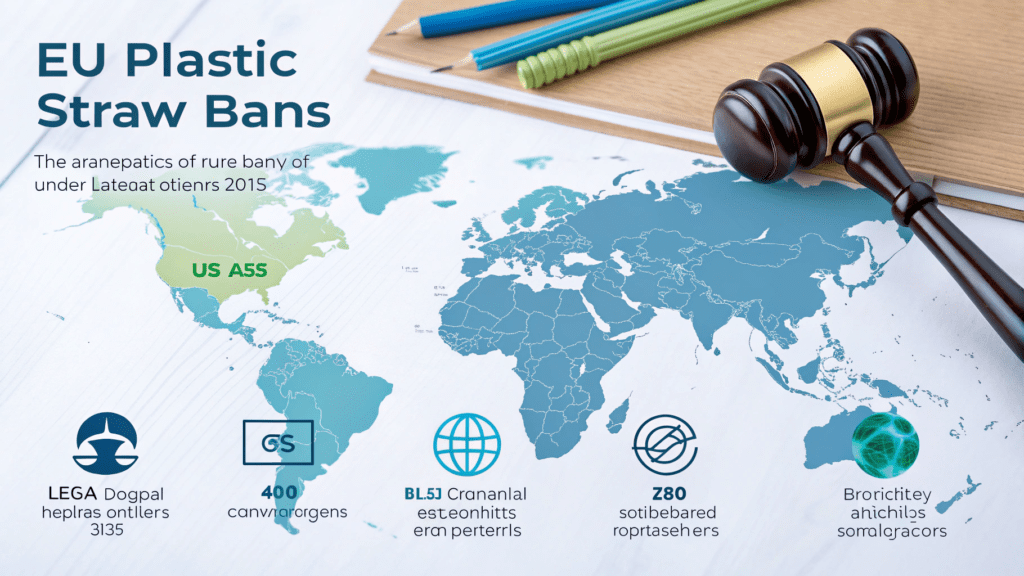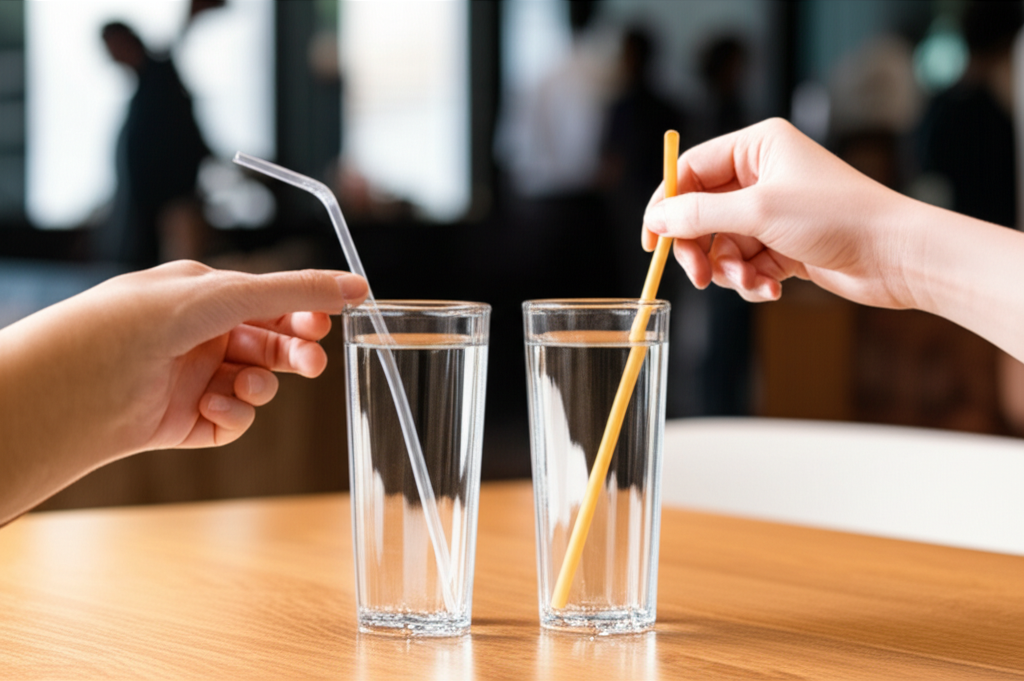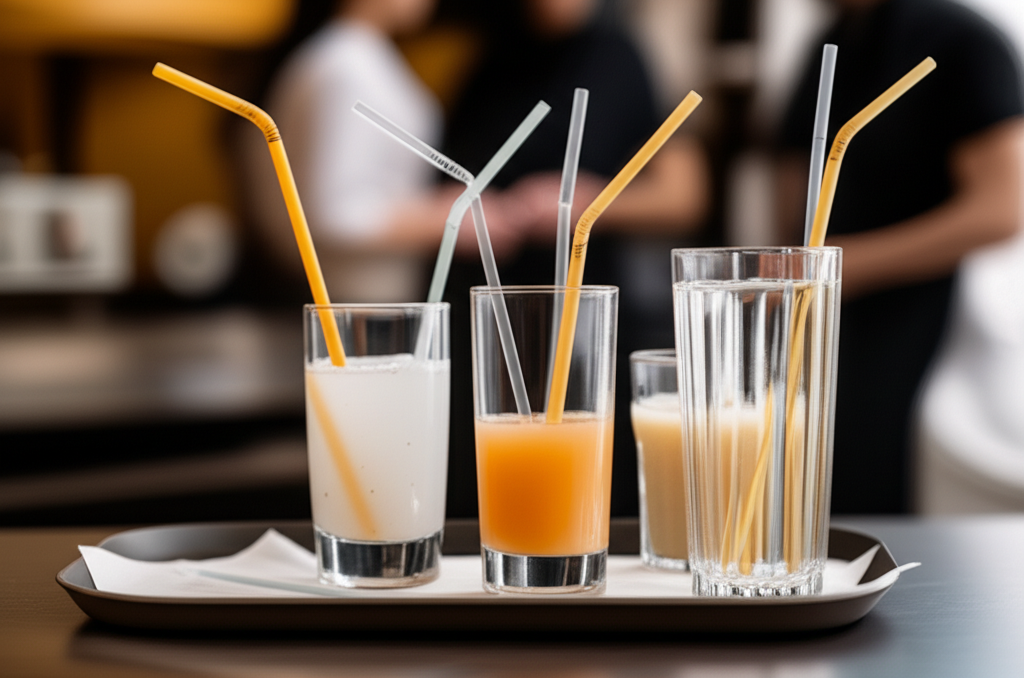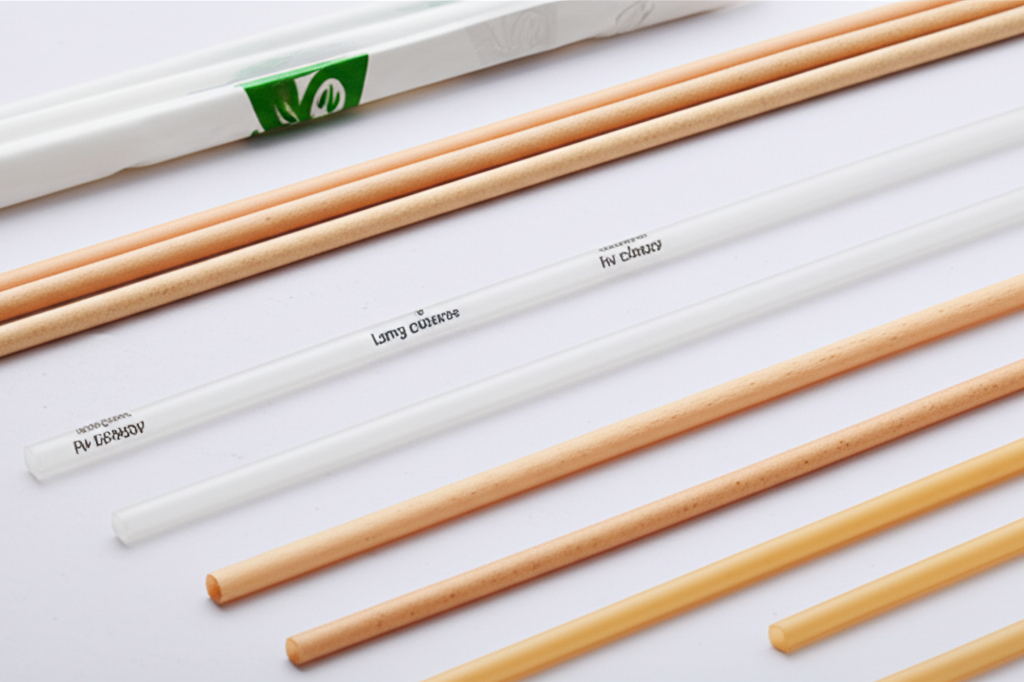Navige dirabilite ak aksè nan chèn ekipman modèn lan.

The Urgent Need for Sustainable & Accessible Straw Solutions
Sektè B2B Ospitalite ak sèvis manje yo jwenn tèt yo nan yon moman esansyèl, navige nan yon peyizaj refòme pa eskalade enkyetid anviwònman an ak manda regilasyon sevè. Presyon imans ki soti nan yon kriz fatra mondyal, ak otèl poukont yo jenere yon estime 150 milyon tòn plastik pou yon sèl itilize chak ane - yon stupéfiants 300,000 moso pa mwa pou yon otèl 200 chanm - mande atansyon imedya. Delij plastik sa a, ak sèlman apeprè 10% tipikman resikle, gen konsekans terib pou ekosistèm maren yo, jan yo make pa yon videyo viral 2015 ki montre retire pay plastik nan yon tòti lanmè.
Pi lwen pase enpak anviwònman an, chanjman regilasyon, ki gen ladan entèdiksyon toupatou nan plastik pou yon sèl itilizasyon atravè Inyon Ewopeyen an, Wayòm Ini, ak anpil vil Etazini, ap transfòme pratik akizisyon. Non-konfòmite, patikilyèman ak entèdiksyon sou atik tankou kouver plastik ak resipyan polystyrène elaji, pote gwo penalite finansye ak risk gwo domaj repitasyon. Nan yon epòk kote 80% nan konsomatè yo bay priyorite opsyon ekolojik-zanmitay, echèk pou adapte yo ak pratik dirab, espesyalman ak atik trè vizib tankou pay, dirèkteman enpak sou pèsepsyon mak, lwayote kliyan, ak pozisyon konpetitif.
Pou biznis ki fè fas ak defi sa yo, pay pou bwè enb la, patikilyèman varyant long bendy a, prezante yon etid ka inik nan balanse sèvis piblik istorik ak enperatif modèn. Envansyon Joseph Friedman an 1937 te revolisyone konvenyans pou bwè, espesyalman pou timoun ak moun ki gen yon mobilite limite, yon fonksyon aksè esansyèl ki rete kritik nan Ospitalite B2B jodi a. Sepandan, entèdiksyon plastik byen entansyonèl ka envolontè kreye baryè pou moun ki andikape ki konte sou fleksibilite espesifik ak rezistans nan pay bendy. Papye ak altènativ rijid yo souvan tonbe kout, poze danje toufe oswa pwouve enposib akòz sogginess oswa mank de manyablite. Demann operasyon nan anviwònman sèvis manje trè aktif, soti nan restoran sèvis rapid yo nan resort segondè, mande pou pay ki ijyenik (de preferans vlope endividyèlman), dirab ase pou divès kalite bwason (soti nan likid mens nan fwete epè), epi ki disponib nan longè ki apwopriye pou divès drinkware, asire sèvis san pwoblèm ak satisfaksyon kliyan. Nesesite pou yon solisyon pay fleksib, gaya ak aksesib, Se poutèt sa, pa janm te plis peze.
Anbrase solisyon pay dirab ak aksesib pa opsyonèl ankò; li se yon enperatif estratejik pou biznis Ospitalite ak sèvis manje.
Market & Regulation Insights: Navigating the Global Landscape
Mache a ap reponn ak solisyon inovatè dirab. Materyèl pwochen jenerasyon ofri pèfòmans amelyore san pri anviwònman an nan plastik tradisyonèl yo, pouse mache mondyal pay ekolojik la nan yon prevwa 25.1 milya dola pa 2035.

| Regulation Name & Date | Scope & Banned Items | Kondisyon Konfòmite pou Paille | Sanksyon Ranfòsman |
|---|---|---|---|
| Directive 2021 sou plastik pou yon sèl itilizasyon Inyon Ewopeyen an | Entèdiksyon yon sèl-itilize kouver plastik, asyèt, pay, brase, baton balon, ak resipyan manje polistirèn elaji. | Bann plastik yo entèdi. Altènatif yo dwe ki pa plastik epi de preferans biodégradables/konpostab. Egzanpsyon pou itilizasyon medikal ka aplike. | Eta manm aplike penalite, souvan ki gen ladan amann enpòtan ak potansyèl fèmen biznis pou repete non-konfòmite. |
| Kalifòni AB 1884 (2019) | Restoran sèvis konplè yo ka bay pay plastik pou yon sèl itilize sèlman sou demann kliyan yo. | Paiyon plastik yo pa entèdi kareman, men yo limite pou "sou demann" sèlman. Biznis yo dwe ofri altènativ ki pa plastik. | Amann $25 pa jou pou vyolasyon, jiska yon maksimòm anyèl $300. |
| Règ pou Jesyon Fatra Plastik Lend (Amande 2021) | Entèdiksyon te idantifye atik plastik pou yon sèl itilize tankou pay plastik, kouver, ak fim anbalaj anba yon epesè sèten. | Bann plastik yo entèdi. Biznis yo dwe chanje nan altènativ ki sètifye konpostab oswa biodégradables. | Sanksyon yo varye selon eta, tankou amann (pa egzanp, ₹5,000 a ₹100,000) ak potansyèl prizon pou delenkan ki repete yo. |
Règleman mondyal yo rapidman elimine pay plastik pou yon sèl itilizasyon, fè konfòmite ak altènativ dirab yon nesesite biznis enpòtan.
Solution: Sugarcane Straws – The Sustainable & Accessible Choice
Paille kann yo se altènativ inovatè ki baze sou plant nan plastik, ki ofri durability ak biodégradabilite konplè.
PHA (Polyhydroxyalkanoates) pay, pou egzanp, imite solidite plastik, yo konplètman biodégradables nan divès anviwònman (tè, maren, konpòs lakay), epi kenbe tèt ak pi wo tanperati. Paille kann, ki fèt ak sous-pwodwi agrikòl upcycled, se 100% biodégradables ak kay konpostab, kraze nan semèn a mwa. Paille manjab ofri yon solisyon vrèman zewo-fatra, ki disponib nan divès gou epi kenbe frigidité pou peryòd pwolonje. Yon segman k ap grandi nan mache a bay priyorite solisyon ki 100% ki baze sou plant, ki pa mande pou konpostaj endistriyèl, epi ki pa gen mikroplastik danjere, PFAS, ak BPA, ki aliman ak pi wo estanda sante ak anviwònman an. Menm pay papye yo ap evolye ak kouch amelyore ak adezif natirèl pou konbat sogginess, adrese yon pwen doulè kle pou operatè yo ak konsomatè yo sanble. Gwoup Ospitalite dirijan yo nan tou de Etazini ak Ewòp ap fè tranzisyon avèk siksè, rapòte rediksyon enpòtan nan fatra dechaj yo ak fidbak kliyan pozitif akòz amelyore pèfòmans pay konpare ak vèsyon papye anvan yo.

Benefis ki mezire nan pay kann:
- Pri Ekonomi: Pandan ke pri inisyal ta ka yon ti kras pi wo, ekonomi alontèm nan amann evite ak imaj mak amelyore ka mennen nan yon rediksyon pri jeneral 10-15%.
- Vitès dekonpozisyon: Konplètman kay konpostabl, kraze nan 90-180 jou, siyifikativman pi vit pase plastik (dè santèn de ane).
- Konfòmite anfòm: 100% konfòme ak aktyèl ak antisipe entèdiksyon plastik pou yon sèl-itilize globalman, ki gen ladan Inyon Ewopeyen an Single-Use Plastics Directive 2021.
- Nòt imaj mak: Amelyore pèsepsyon kliyan, potansyèlman ranfòse nòt imaj mak pa 15-20% nan mitan konsomatè ekolojik-konsyan.
- Aksesiblite: Kenbe fleksibilite ak rezistans, enpòtan anpil pou kliyan ki gen mobilite limite, asire sèvis enklizif.
| Karakteristik/metrik | Tradisyonèl plastik Long Bendy Paille | Papye estanda Long Bendy Paille | Avanse Dirab Long Bendy Paille (PHA/Kann/Manjab) |
|---|---|---|---|
| Pri inisyal (en) | Pi ba | Modere | Modere rive pi wo (dekline ak echèl) |
| Enpak anviwònman an | Trè wo (polisyon, dekonpozisyon long) | Modere (apwovizyone, kèk pwoblèm pann) | Trè ba (konplètman biodégradables, konpostab, upcycled) |
| Dirab / Pèfòmans | Segondè (fleksib, rezistan a sogginess) | Ba (tandans pou tranpe, pann) | Segondè (imite plastik, gaya, reziste anba dlo) |
| Aksè pou moun ki andikape | Segondè (fleksibilite, konsistans) | Ba (tranpe, risk toufe, enflexibilite) | Segondè (konsye fleksibilite ak rezistans nan plastik) |
| Custom Branding | Wi | Wi | Wi (enpresyon bon jan kalite, mesaj ekolojik-konsyan) |
| Risk Konfòmite | Trè wo (ogmante entèdiksyon) | Ba | Trè ba (satisfè ak depase règleman yo) |
| Enpak imaj mak | Negatif (si yo wè li kòm ki pa dirab) | Net pou pozitif | Trè pozitif (demontre lidèchip nan dirab) |
| Jesyon fatra | Dechaj (difisil pou resikle) | Konpostaj (si enfrastrikti disponib) | Vrè konpostaj/biodegradasyon, kèk zewo-dechè manjab |
Paille kann ofri yon melanj siperyè nan pèfòmans, responsablite anviwònman, ak konfòmite regilasyon pou Ospitalite modèn.
Industry Misconceptions & Clarifications
Navige sou mache pay dirab la mande enfòmasyon klè pou evite enkonvenyans komen.
Lejann 1: "PLA se konplètman konpostab toupatou."
Koreksyon:Asid polilaktik (PLA) se konpostabl endistriyèl, sa vle di li mande kondisyon espesifik (chalè segondè, aktivite mikwòb) yo jwenn sèlman nan enstalasyon konpostaj komèsyal yo. Li pa kraze nan bwat konpòs lakay yo, depotwa yo, oswa anviwònman maren. Mete yon move etikèt sou PLA kòm konpostab inivèsèl mennen nan kontaminasyon nan kouran resiklaj ak depotwa yo.
Lejann 2: "Chalimo papye yo toujou pi bon opsyon ekolojik."
Koreksyon:Pandan ke pi bon pase plastik, anpil pay papye yo aliyen ak polyethylene (PE) oswa lòt kouch ki pa biodégradables pou anpeche sogginess, ki fè yo difisil pou resikle oswa konpòs. Pwodiksyon yo kapab tou gen anpil resous. Paille papye avanse ak kouch natirèl yo amelyore, men materyèl tankou kann oswa PHA ofri biodégradabilite siperyè ak pèfòmans.
Lejann 3: "Paillets dirab yo twò chè pou itilizasyon an gwo B2B."
Koreksyon:Pandan ke pri inisyal inite yo ta ka yon ti kras pi wo pase plastik tradisyonèl yo, retounen alontèm sou envestisman (ROI) nan imaj mak amelyore, ogmante lwayote kliyan, ak evite amann ki pa konfòme yo byen depase diferans lan. Kòm pwodiksyon echèl, pri pou altènativ dirab yo ap diminye rapidman, sa ki fè yo de pli zan pli konpetitif pou akizisyon an gwo.

Konprann nuans materyèl dirab enpòtan anpil pou pran desizyon akizisyon enfòme ki vrèman benefisye biznis ou ak planèt la.
B2B Customization & Supply Chain Optimization
Pi lwen pase konfòmite sèlman, estratejik adopte avanse dirab long bendy pay ofri avantaj konpetitif enpòtan. Custom mak pay ou ak yon logo oswa konsepsyon transfòme yon komodite nan yon zouti maketing pwisan. Sa a subtilman ranfòse angajman mak ou a nan bon jan kalite ak dirab, elve eksperyans kliyan an. Pou egzanp, manifaktirè tankou Rizhao New Zhengyuan Straw Co, Ltd ofri sèvis OEM / ODM pou desen koutim, ak pri esansyèl diminye anpil ak volim - soti nan $ 0,0031 pou 100,000 inite a $ 0,0027 pou 5,000,000 + inite pou lòd en. Akizisyon an gwo asire non sèlman pri-efikasite, men tou yon rezèv ki konsistan, vital pou operasyon gwo volim. Opsyon ki vlope endividyèlman amelyore ijyèn, diminye risk kontaminasyon kwa, epi rasyonalize sèvis nan anviwònman sèvis manje ki rapid. Patenarya ak founisè ki ofri divès kalite materyèl ki sètifye dirab asire biznis ou ka adapte yo ak règleman k ap evolye ak preferans konsomatè yo, diminye risk konfòmite nan lavni ak amelyore compétitivité sou mache a.
Optimize chèn apwovizyonman Paille Dirab ou a:
- Ranje MOQ:
- Ti Achtè Mwayen: Kantite Lòd Minimòm (MOQ) anjeneral varye ant 50,000 ak 250,000 inite.
- Achtè antrepriz: MOQ yo ka kòmanse soti nan 500,000 inite, ak repo pri enpòtan pou lòd ki depase 1,000,000 inite.
- Opsyon mak:
- Enpresyon: Logo koutim enprime dirèkteman sou pay lè l sèvi avèk lank manje.
- Anbalaj: Anbalaj papye endividyèl make, desen bwat koutim, ak opsyon anbalaj esansyèl.
- Dyamèt/longè personnalisation: Adapte dimansyon pay yo anfòm espesifikman bwason oswa kalite bwason (pa egzanp, pi laj pou fwete, pi long pou linèt wo).
- Lead Times & Shipping:
- Tan pwodiksyon estanda yo anjeneral 3-5 semèn apre apwobasyon konsepsyon.
- Anbake an gwo atravè machandiz lanmè se pi pri-efikas pou gwo lòd, ak tan transpò varye selon destinasyon (egzanp, 4-6 semèn nan Amerik di Nò / Ewòp).
- Opsyon machandiz akselere yo disponib pou bezwen ijan.
- Konsèy Jesyon Envantè:
- Aplike yon sistèm envantè jis nan tan (JIT) pou minimize depans depo ak fatra.
- Etabli pwen rekòmande ki baze sou done istorik konsomasyon ak tan plon.
- Konsidere stock tanpon pou sezon pik oswa pik demann inatandi.
Akizisyon èstratejik ak personnalisation nan pay dirab ka siyifikativman amelyore efikasite operasyonèl ak valè mak.
Bonjan apèl a aksyon ak rezilta mezirab
Mache pay pou bwè mondyal la, ki prevwa rive nan plis pase 23 milya dola pa 2031, ak sektè B2B domine lavant yo, prezante yon manda klè: adapte oswa tonbe dèyè. Anbrase solisyon avanse, customizable long bendy pay ofri yon avantaj konpetitif byen mèb. Li pa jis sou règleman reyinyon; li se sou pwoaktif adrese enkyetid anviwònman an, amelyore satisfaksyon kliyan (ki gen ladan bezwen kritik aksè), ak ogmante mak koutim ranfòse pozisyon mache ou. Fè operasyon ou yo prèv pou lavni, amelyore atire mak ou a, epi mennen wout la nan Ospitalite dirab.
Pare pou ogmante sèvis bwason B2B ou a ak payi long bendy prim ak mak koutim? Sekirize kwen dirab ou nan yon mache konpetitif. Mande yon sitasyon pwepare ak echantiyon pwodwi jodi a lè w vizite yon founisè an gwo, eksplore opsyon materyèl inovatè, oswa konsilte ak yon òganizasyon defans aksè pou asire pratik enklizif pou tout kliyan ou yo.
Eksplore solisyon Custom pay nou yo
Lè w chanje nan pay dirab long bendy, ou ka diminye fatra pay pa 80% epi amelyore nòt satisfaksyon kliyan pa 15%.
- Aprann plis sou enpak sou anviwònman an nan pay plastik: https://www.4ocean.com/blogs/news/plastic-straw-pollution
- Konprann enpòtans aksè nan konsepsyon pwodwi: https://www.disabilityrightsuk.org/news/2020/january/plastic-straws-and-disability
- Eksplore apèsi sou mache mondyal la sou pay pou bwè: https://www.grandviewresearch.com/industry-analysis/drinking-straws-market
Kesyon yo poze souvan (FAQ)
Èske pay kann legal nan Inyon Ewopeyen an?
Wi. Apati 2024, pay kann yo konplètman konfòme ak la Directive 2021 sou plastik pou yon sèl itilizasyon Inyon Ewopeyen an, jan yo ye pa fèt ak plastik ki baze sou gaz fosil.
Ki jan pay kann konpare ak pay papye an tèm de rezistans?
Paille kann jeneralman ofri siperyè durability epi rezistans nan sogginess konpare ak anpil pay papye estanda, kenbe entegrite yo nan bwason pou peryòd pwolonje.
Èske pay kann yo ka make koutim pou biznis Ospitalite mwen an?
Absoliman. Dirijan manifaktirè yo ofri opsyon personnalisation vaste, ki gen ladan:
- Enpresyon logo koutim
- Anbalaj endividyèl ki make
- Dyamèt espesifik ak ajisteman longè pou lòd esansyèl
Ki tan yo tipik pou lòd en pay dirab?
Tan pwodiksyon estanda pou lòd esansyèl yo anjeneral 3-5 semèn, ak plis tan pou anbake machandiz lanmè depann sou destinasyon an. Opsyon akselere ka disponib.
Èske pay long bendy aksesib pou moun ki gen andikap?
Wi. Fleksibilite a ak rezistans nan long pay bendy yo enpòtan anpil pou anpil moun ki gen yon mobilite limite. Altènativ dirab tankou pay kann yo fèt pou kenbe karakteristik aksè esansyèl sa yo.






